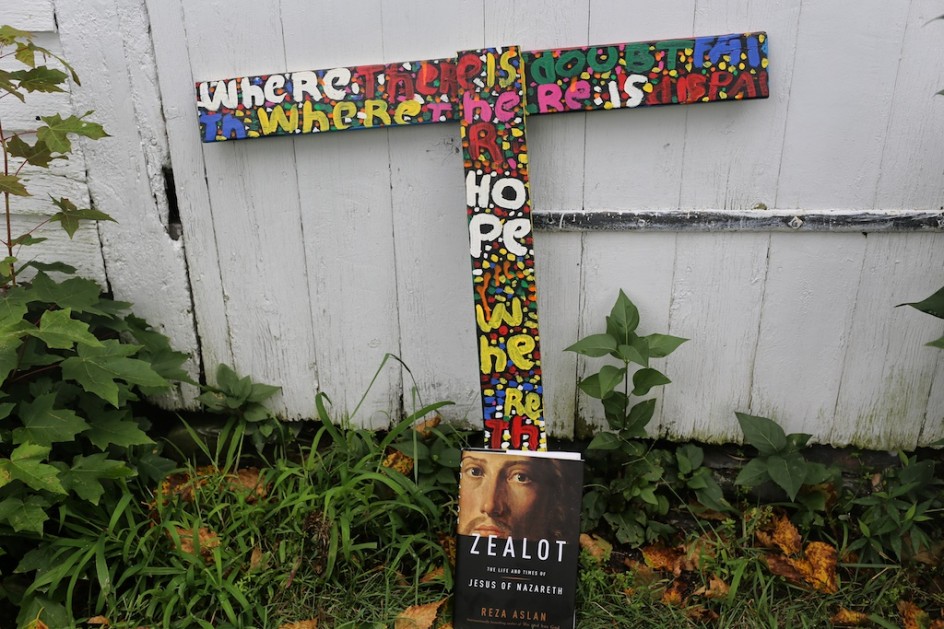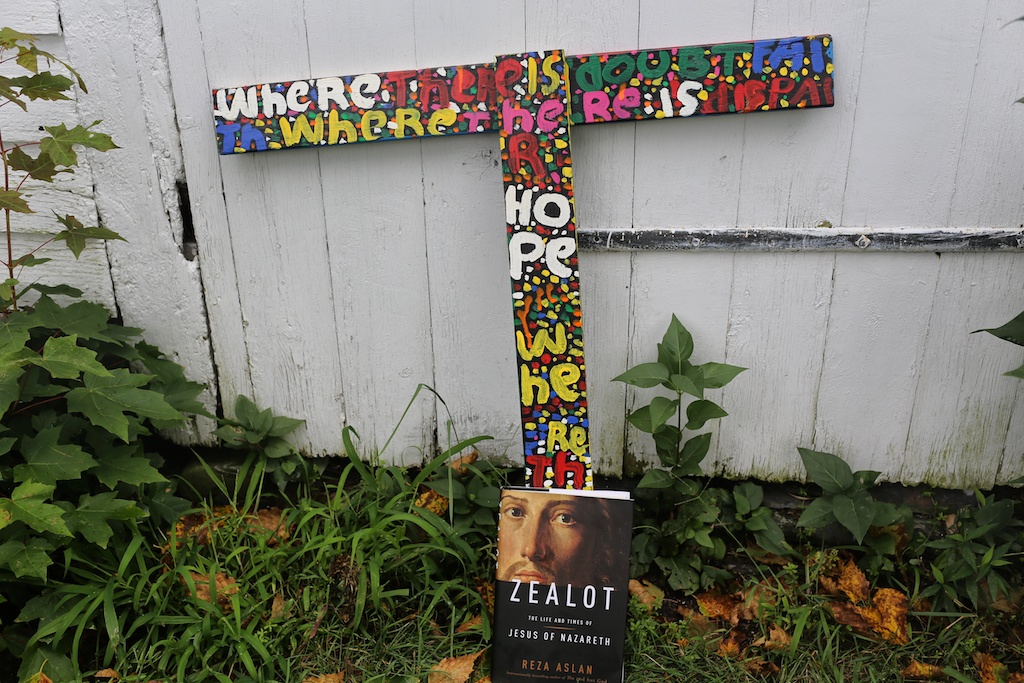
(Note. These reviews are done in support of independent bookstores, particularly my bookstore, Battenkill Books in Cambridge, N.Y. If you wish to read or purchase this book please consider buying it from Battenkill or from your local independent bookstore. We are in a struggle to preserve local commerce, individuality, personal service and a life beyond the corporate grip. Think about a world without bookstores, and thanks. You can call the store at 518 677-2515, or visit their website, or e-mail Connie Brooks at connie@battenkillbooks.com And thanks.)
You may have heard of Zealot, a new study of the life of Jesus Christ by scholar/writer Reza Aslan. It is currently the number one bestselling book in America, and there are two reasons for that. One is that it is a wonderful book, insightful and thought-provoking, beautifully written, meticulously researched. Another is the now infamous Fox News interview with Aslan, almost without question one of the most painful and ignorant interviews ever done with an author – or anyone – on a major broadcast news outlet. As a former television producer, I can testify that is saying something.
Politics aside, this interview is so painfully stupid and bigoted that many tens of people rushed to get the book, me included. I didn’t care so much about the interview as I was fascinated by the subject, a historical look by a religious scholar at the real life of the real Jesus, not the celestial Jesus-in-a-halo that has overwhelmed and nearly obliterated the story of his life. Zealot shot to the number one spot on Amazon overnight and is still there, weeks later. It deserves to be. In publishing, there really is no such thing as bad publicity.
I am grateful to Fox News for this interview, and for leading me to this book. I pay no attention to cable politics left or right and Fox news has always seemed to me the xenophobic anger machine of angry old white men much more than a serious news organization, but I admired Aslan’s adroit and poised handling of the clueless soul who repeatedly attacked him for being a Muslim who dared to write a book about Jesus. In a brilliant performance, Aslan managed to slip in a great description of the book amidst the blundering assaults of the so-called interviewer.
Watching the interview – which has been seen an estimated 4 millions times over the Internet – I get the sense Aslan, who was born in Iran but now teaches in California, quickly realized his great opportunity and took off for the goal line. There is some justice in the world, for sure.
Why would you, a Muslim, write a book about Jesus, a christian?, the interview asked him asked (honest). “Because, it’s how I make a living,” he answered. Fox News officials later said they thought the interview was terrific, the shock and complaints the results of the usual hysterical liberal media. If Fox thinks this interview did them any good, they are beginning the long slide.
Aslan is a Phd academic, a long time scholar of religious studies, and a distinguished and much decorated author of books on Judaism, Christianity and the Muslim world. There are not too many people better qualified to write about the life of Jesus Christ, and few writers I am aware of have done it in a better or more interesting way.
In case I should be interviewed by Fox News (I should be so lucky) I guess I now have to confess to being a Jew who is loving and reviewing a book a Muslim scholar has written about Jesus Christ. There, nobody can’t say I didn’t disclose it. How dare I? Don’t Jews deny that Christ is the Son Of God? I apologize, Mr. Jefferson, you must be spinning in your Monticello tomb.
The major premise of Aslan’s surprisingly – even grippingly – readable book is to focus on Jesus the human being rather than Jesus as the Christ figure. Aslan questions many of the elements of the official Christian story of Jesus – it is unlikely, he writes, that Jesus could have been born in Bethlehem, even less likely that Pontius Pilate would have given him a trial or spoken with him or pleaded for his life. (Pilate sent many tens of thousands of Jews to the Cross without interviews or trials). Aslan doubts the Romans were mocking Jesus when they put a plaque over his cross saying “King Of The Jews,” the Romans did not have a sense of humor about these things, he suggests, they were crucifying Jesus because that was the penalty for sedition, for crimes against Rome. Advocates for the poor are rarely seen on television in America, certainly never on Fox News, they are marginalized as dangerous zealots themselves. This helped me to visualize the story of Jesus. They had the rich and corrupt Temple Priests, we have investment bankers and members of congress.
Aslan takes a close and carefully nuanced looked at the world Jesus lived in to paint a wonderful portrait of Jesus the revolutionary, Jesus the very political human. I was surprised by the savagery and chaos if life in that time and world, the world Jesus grew up in.
Jesus Christ was clearly a very serious threat not only to the Romans but to the High Priests of the Temple Of Jerusalem, which he repeatedly threatened to destroy and whose leaders he attacked as corrupt and faithless almost everywhere he went. It is so interesting about Jesus Christ, almost nothing is known about his life other than his work healing the poor for free – healers at the time charged a lot for their work – and his Crucifixion, which was well documented by the Romans. It is not known if Jesus was married – Aslan thinks it was likely that he was – or what he did before his healing work brought him fame across Israel. I loved seeing Aslan fill in the blanks of this remarkable life, and I knew little about Jesus’ brother James, a righteous and influential figure in Christian history.
The later gospels and other writings about Jesus elevated him to Godlike status – they were creating a new faith and tried to fit Jesus’s life into the story they needed – and began re-writing the known history of the man. Christian scholars avoided describing him as the political revolutionary he was, instead transforming him into a Godly ethereal spirit, not a political person, not a zealot but something celestial, larger than life. But zealot most precisely describes what Jesus was, Aslan writes. Israel at the time was in great turmoil and political upheaval, all kinds of self-proclaimed messiahs, revolutionaries, radicals, many violent, had sprung up to challenge the Roman occupation and the greedy and remote rabbis and priests of the Great Temple, the center of world Judaism at the time. The bloody destruction of Jerusalem by Rome in reprisal for the Jewish rebellion against them is described in wrenching detail.
Decades after Christ’s death, Titus’s Roman Army re-took Jerusalem, slaughtered almost every inhabitant of the city, sent thousands of woman and children into slavery, burned the Temple and every building in the city to the ground and sent the Jews into their great exile known as the Diaspora. The Christian theology that sprung up later around the life of Jesus blamed the Jews, not the Romans for his death, in part because Rome had adopted Christianity as the empire’s faith. (Aslan says it seems clear that Pilate was not in any way reluctant to kill Jesus as Christian theologians have suggested, but considered him a very serious threat to Roman rule). This re-working of the story of the crucifixion of Christ changed the world and set the template for two thousand years of persecution of the Jews.
By the time Christian bishops gather in 398 C.E. to sanctify the New Testament and define the new Christian theology, almost all connection between the political revolutionary who fought for the poor had been broken. “Two thousand years later,” writes Azlan, “the Christ of Paul’s creation has utterly subsumed the Jesus of history. The memory of the revolutionary zealot who walked across Gaillee gathering an army of disciples with the goal of establishing the Kingdom of God on earth, the magnetic preacher who defied the authority of the Temple priesthood in Jerusalem, the radical Jewish nationalist who challenged the Roman occupation was lost to history.”
That, writes Azlan, is a shame, because the one thing any study of history reveals again and again is that “Jesus of Nazareth – Jesus the man – is every bit as compelling, charismatic, and praiseworthy as Jesus the the Christ. He is, in short, someone worth believing it.”
Among the many bizarre things about the Fox interview was the assumption that Aslan had to be attacking Christ because he is a Muslim, as if no Muslim could possibly deviate from any Muslim position or theology. But as the above paragraph suggests, Aslan loved the Jesus he was researching, admired him tremendously and seeks to remind us of the real reason he became great and revered – not because he turned the other cheek but because he didn’t. He was the architect of the great Christian idea – subsumed in America by ideologues, politicians and clueless opportunists – that we need to take care of the poor if we wish to be true human beings. I wonder sometimes if the bubbleheaded politicians who blame the poor for their troubles and invoke Jesus name relentlessly have even the slightest clue what he was really like, what he believed in. He gave his life for that as much as for the sins of humanity, suggests Zealot. In our time, faith is supposed to be blind, original thinking or debate blasphemy. But for me, real faith is about exploration, not stasis or blind submission. I recommend this book very highly.
No wonder nobody wants to hear a message like that on Fox News or in the Corporate Nation. I loved this book, and not just because of the simple-minded attacks on Aslan – the book is lavishly praised in review after review by scholar after scholar – but because it made so much sense to me, the research was so convincing, Aslans confidence and sense of the time so rock solid. This is a very special story in very special book.
I loved and admired the Jesus I was reading about in this book, finally, I thought, some chance of knowing the man who changed the world, not just Biblical representations and sanitized versions of the Son Of God. I can see why so many people believed he had come to saved the world. He tried. I was mesmerized by this book, couldn’t put it down.
Aslan’s Jesus does seem almost God like, a courageous and compassionate man, a person of great principle and undeniable powers to heal and inspire people. He was a truth teller, sacrificing his life to challenge the vicious Roman occupation and the corrupt Jewish High Priests who conspired with the Roman Emperors to loot and murder their own people. I would loved to have known that man.

